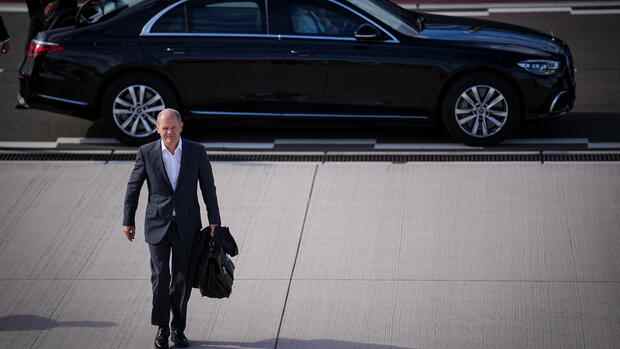The chancellor has taken up the cause of strengthening cooperation between democracies in order to be able to compete with autocracies such as China and Russia.
(Photo: dpa)
Montréal Chancellor Olaf Scholz (SPD) has introduced himself to around two dozen countries on four continents since he was sworn in in December. For none of them did he put as much effort into his inaugural visits as he does now for Canada.
He takes three days to visit the second largest country in the world in terms of area, but which has not even half as many inhabitants as Germany. For comparison: In February, he was only half as long for his inaugural visit in the much more powerful and economically stronger neighboring country USA.
But that’s not all: Scholz has brought in reinforcements for this trip. Vice Chancellor and Economics Minister Robert Habeck (Greens) flew with him to Montreal on Sunday evening, the first of three travel stops. The two had only been together once before, in May at a North Sea summit in Denmark.
In addition, Scholz will be accompanied for the first time by a larger business delegation led by Industry President Siegfried Rußwurm and made up of a dozen top managers, including the CEOs of Volkswagen, Bayer, Siemens Energy and Uniper. A total of more than 80 passengers flew in the government aircraft.
Top jobs of the day
Find the best jobs now and
be notified by email.
But what is Scholz and Habeck doing all the effort for? There are economic and political reasons for this:
Economic reasons
Russia’s war of aggression against Ukraine is forcing Germany to broaden its economic relations. This applies very acutely to the energy sector, in which one wants to become independent of Russian gas supplies.
Germany wants to make itself independent of Russian gas supplies.
(Photo: dpa)
Although Canada has liquid gas to offer, Germany can only benefit from this in the medium term because there are still no pipelines and terminals for transport across the Atlantic. The focus of the trip is therefore on hydrogen production.
In addition, German industry is interested in Canadian minerals and metals, including cobalt, nickel, lithium and graphite, which are important for battery production.
Political reasons
In principle, Canada has what Russia has to offer economically – and that as a reliable democracy. That’s the second reason why this trip means so much to Scholz.
The 50-year-old Trudeau has already visited Scholz in Berlin, the two also met at the G7 summit in Elmau and at the NATO summit in Madrid.
(Photo: Reuters)
The chancellor has taken up the cause of strengthening cooperation between democracies in order to be able to compete with autocracies such as China and Russia. That’s why he demonstratively visited Japan before China, which is economically more important for Germany – unlike his predecessors.
The trip also shows that
The transatlantic relationship is more than just good relations with the USA. Canada is also an important partner in the G7 of economically strong democracies and in NATO.
In any case, Scholz gets on really well with Canadian Prime Minister Justin Trudeau. The 50-year-old has already visited him in Berlin, and the two also met at the G7 summit in Elmau and at the NATO summit in Madrid.
During the visit, Trudeau will hardly leave the Chancellor’s side. In Montreal, where he has his constituency, the Canadian Prime Minister will hold his political talks with Scholz on Monday. On Tuesday we continue to the economic metropolis of Toronto and finally to remote Stephenville, a small town in sparsely populated Newfoundland.
>> Read here: All current developments in the Ukraine war in the Newsblog
From there, Chancellor and Prime Minister want to take something tangible home with them: an agreement on cooperation in the production and transport of green hydrogen, which is produced using renewable energies. In the long term, Canada expects to be able to export 25 to 30 million tons of green hydrogen per year. However, transport capacities still have to be created here.
More: Who if not Canada? The fatal ignorance of German politics towards a model partner. A comment.
